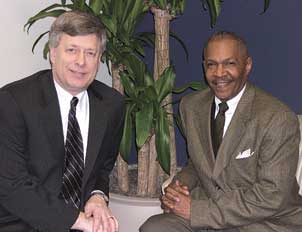The Pitt Chronicle, Past and Future: An Interview With Publisher Robert Hill
 Chancellor Mark A. Nordenberg and Robert Hill
Chancellor Mark A. Nordenberg and Robert HillRobert Hill, Pitt’s vice chancellor for public affairs, created the Pitt Campaign Chronicle in 2000 to support what was then the University’s newly launched $500 million fundraising campaign, whose goal would increase to $1 billion in 2002 and double again in 2006 to $2 billion.
Designed initially to showcase Pitt’s faculty research as well as the accomplishments of the administration, faculty, and staff and the measurable results of the campaign’s success, the weekly paper was first published on Oct. 23, 2000. Chancellor Mark A. Nordenberg and Hill changed the publication’s name to the Pitt Chronicle in Fall 2002 to better reflect its coverage of campus news, information, and events. Celebrating its 10th anniversary this fall, the Pitt Chronicle has evolved into a must-read publication on campus and beyond. It plays a key role in the University’s efforts to disseminate information on the beneficial effects of its tripartite mission: leader in education, pioneer in research, and partner in regional development. In the following Q&A, Hill discusses the Chronicle’s genesis and impact.
PC: Why did you begin the Pitt Chronicle and what has its impact been?
RH: Many research universities tell their stories through their own university periodicals. Obviously, there are many media through which an organization can convey its messages, images, and strategies. But there are few such media that portray an institution’s achievements exactly as the organization wishes. When I arrived at Pitt in 1999, there were no publications that met that latter criterion. I felt we could fill that gap by establishing a University-owned-and-operated publication that would be its official messenger.
As for the Chronicle’s impact, I think it’s been enormous. Of course, as publisher, what else would I think?! To begin with, the University leadership does convey important information through the paper. The Chronicle makes big announcements and publicizes important University victories. In addition, while there was initially reluctance among some faculty to realize the benefits of such a publication, many have come to value it because the paper tells their stories. In the broadest sense, every word that goes into the Pitt Chronicle should be part of the effort to advance the University’s missions: educating students, advancing humankind through research, and serving our host community through regional partnering toward development. With this publication, we’re reaching the campus community, highlighting the important work that goes on here, and touting our successes. That positions our readers to be ambassadors who can then convey those stories and successes to others.
PC: What makes the Pitt Chronicle stand out?
RH: For starters, there is a high standard set for the paper because it represents the University. It must be a first-rate publication, and I believe it is. In the 10 years of its existence, I think we’ve run only a handful of corrections. We put a lot of effort into the editing process.
I also think that the establishment of special reports has been a nice evolution: an annual Back to School issue, two Arts & Culture issues per year, annual Black History Month profiles, annual Women’s History Month profiles, an annual Commencement issue, and periodic series on various facets of the University’s academic endeavors. What’s gratifying is that the bundling of these subjects allows people and issues to come to life in a way that we have not seen before.
We also strive for diversity in our coverage. If you look over any 12-month period of newspapers, you ought to see diversity in the kinds of coverage … a balance between science and technology coverage and our coverage of the arts and humanities, for example. We continually assess whether we have gender balance, racial diversity, and coverage of the programs deemed priorities by the Chancellor and the Provost. Pitt is great because gifted people from a variety of backgrounds forged its eminence through undergrad and research achievements.
PC: Where do you envision the paper going from here?
RH: I am always reaching for the next level of excellence. I don’t care whether you look at it in terms of a dozen Pitt Chronicle issues or one: As happy as I am with any given issue, that individual product can always be improved. We continually strive to create a better newspaper, and I am optimistic that the Pitt Chronicle’s writers and editors will do that as we advance into our second decade.
Other Stories From This Issue
On the Freedom Road

Follow a group of Pitt students on the Returning to the Roots of Civil Rights bus tour, a nine-day, 2,300-mile journey crisscrossing five states.
Day 1: The Awakening
Day 2: Deep Impressions
Day 3: Music, Montgomery, and More
Day 4: Looking Back, Looking Forward
Day 5: Learning to Remember
Day 6: The Mountaintop
Day 7: Slavery and Beyond
Day 8: Lessons to Bring Home
Day 9: Final Lessons

